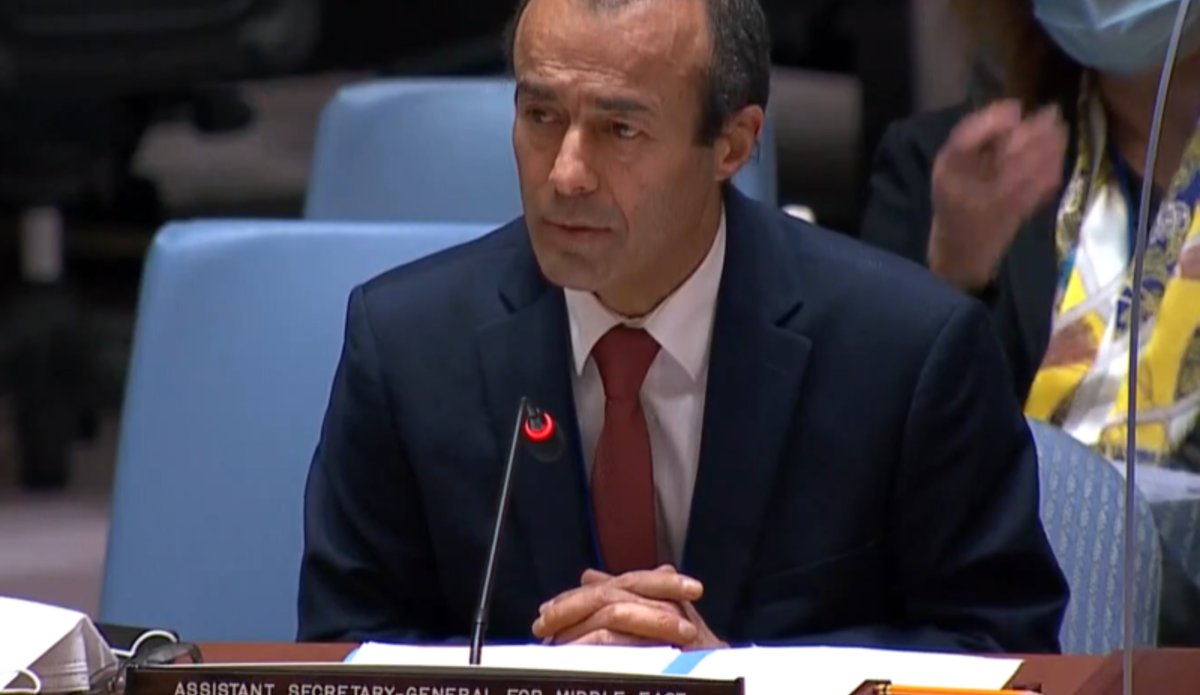,Madam President, Members of the Security Council
The Democratic People’s Republic of Korea – DPRK – has intensified the pace of its launches using ballistic missile technology. Indeed, it has launched more missiles in the past five months than in the prior two years combined.
On 4 May, the DPRK launched a missile using ballistic missile technology which covered a range of 470 km and reached an apogee of 780 km. It was launched from the Sunan area near Pyongyang. The DPRK launched a ballistic missile of possible intercontinental range from the same location on 24 March. The DPRK launched another missile on 7 May, possibly from a submarine, which reportedly covered a range of 600 km and reached an apogee of 60 km. The DPRK did not issue public information on any launch, nor did it issue airspace or maritime safety notifications.
Madam President, the Secretary-General strongly condemns the DPRK’s continued development of missiles using ballistic missile technology. Such actions are clear violations of relevant Security Council resolutions and contribute to increasing tensions in the region and beyond.
It should be recalled that the Security Council, in resolution 2397 (2017), reaffirmed its decisions that the DPRK shall not conduct any further launches using ballistic missile technology.
Madam President, there have been other troubling developments since our last briefing on 25 March.
On 16 April, the DPRK carried out its first launch of a system it characterised as intended for use in quote “tactical nuclear operations”. The system in question covered a range of 110 km. Developing such systems was among the core defence development tasks for the 2021 to 2025 period set forth during the 8th Party Congress of the Korean Workers’ Party in January 2021.
The DPRK leader also made statements on 25 April and again on 30 April that Pyongyang could pre-emptively use its nuclear weapons. Statements of this nature are deeply concerning.
Finally, there are indications of resumed construction activities at the Punggye-ri nuclear test site, which was declared shut down in 2018.
Madam President, these developments all relate to the DPRK’s continuing pursuit of its nuclear programme. While some States continue to rely on nuclear weapons in their security policies, nuclear weapons pose an existential threat to humanity. Their existence heightens the risk of unintended escalation or miscalculation. We must strengthen our efforts to eliminate nuclear weapons.
We have consistently conveyed our concerns to the DPRK. The DPRK, by continuing to pursue its nuclear weapons programme, including its development of missiles using ballistic missile technology, however, continues to defy the repeated demands of the Council to cease such activities.
Madam President, the Secretary-General reaffirms his commitment to working with all parties for sustainable peace and the complete and verifiable denuclearization of the Korean Peninsula.
He urges the DPRK to comply with the decisions of the Council, reset the course to dialogue and build on previous diplomatic efforts.
Further, the United Nations welcomes and encourages the regular contact and cooperation among the key parties regarding the Korean Peninsula. We commend the parties for their willingness to engage in dialogue with the DPRK without preconditions.
Madam President, the Secretary-General reiterates the importance of addressing the critical humanitarian needs of people in the DPRK.
The United Nations remains engaged and stands ready, along with its humanitarian partners, to assist people in need in the DPRK, whose vulnerability has likely increased since the pandemic outbreak and border closures in 2020.
We reiterate our call for the entry of international staff, including the United Nations Resident Coordinator, and the unimpeded entry of humanitarian supplies, to allow for a timely and effective response.
We also acknowledge the work of Member States toward resolving the banking channel for humanitarian operations and emphasise the growing urgency for its conclusion.
Madam President, let me close by reiterating that the unity of the Security Council in this matter is essential to ease tensions, overcome the diplomatic impasse and avoid a negative action-reaction cycle.
Thank you.

